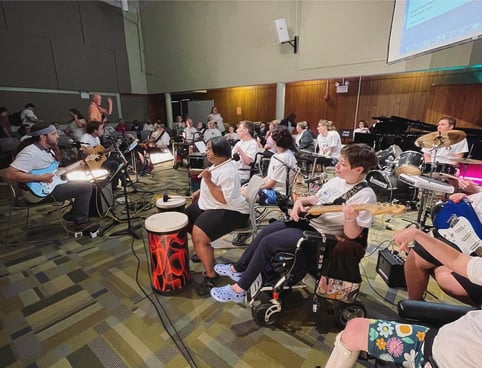Quality of Life Grants Spotlight: The Michigan State University Community Music School
Join Our Movement
What started as an idea has become a national movement. With your support, we can influence policy and inspire lasting change.
Become an Advocate
Before accessibility to music therapy sessions increased, Don played his electric guitar with lots of support before the CMS program had iPads and apps. Playing his guitar was challenging. But, Don didn’t give up and could play a few notes in a song. After he began using an iPad, he used the guitar app and played the electric guitar as much as he wanted in the music sessions. He could play the guitar without anyone’s help.
His mother said, “Don lost all of his programming and services because of COVID-19, but continued to participate in his music services because of CMS’s virtual sessions. Also, Don rejoined his peers in music therapy camp. He attended in person in the early years of the camp’s existence. Unfortunately, he could no longer participate after a dog was introduced to the camp. Now, because of the funding, he can once again be a part of the camp as he attends music therapy classes virtually.”
Post-COVID-19 social isolation regulations, the CMS continues to offer music therapy sessions virtually. Participants in the program love to have the option to have sessions at home. The staff at CMS report, “We see some individuals play, sing, talk, or laugh more than they did when they attended sessions in person.” Everyone is a part of making music because no one is muted.
The future of the CMS program is bright. The goal is to continue using virtual sessions to build a sense of community and belonging thanks to the stations provided by the Reeve Foundation’s grant.
To learn more about the Reeve Foundation’s Quality of Life Grants Program, please see: www.ChristopherReeve.org/QOL.
During the COVID-19 pandemic, the Reeve Foundation’s National Paralysis Resource Center created a special grants category (COVID-19: Addressing Social Isolation) for non-profit organizations to address social isolation by providing programs and projects to support the physical and mental health of people living with paralysis.
Christina Sisti, DPS, MPH, MS is a bioethicist and health care policy advocate. She works to create awareness and improve health care policy for those with long-term health issues.
 The founders of the Music Therapy Clinical Services program at the Community Music School is an inclusive music program. People with physical, cognitive, social, self-expression, or mobility issues receive individual and group sessions at CMS. Each individual has a treatment plan that reflects their unique needs. Participants soon realize that anyone, regardless of their disability/ability, can be a part of the program.
The founders of the Music Therapy Clinical Services program at the Community Music School is an inclusive music program. People with physical, cognitive, social, self-expression, or mobility issues receive individual and group sessions at CMS. Each individual has a treatment plan that reflects their unique needs. Participants soon realize that anyone, regardless of their disability/ability, can be a part of the program.